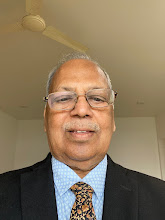Morning Muses: My encounters with Competency movement
T. V. Rao
1965- 66: Learnt
about Lesson plans and how to teach concepts, knowledge, attitudes and skills (K,
A,S) in B. Ed. course at the Regional
College of Education, Mysore from best Teachers like Dr. P N Dave, (just
returned working at St. Louis with Richard D’ Charms), C L Anand and PR Nair
1966-68: Learnt
all about learning theories, traits, types, self concept, 16 PF and many other
tests including McClelland’s TAT for Achievement Motivation Training (AMT).
MBTI was not yet popular
1969-70: Leant
how to develop programmed material to teach K, A and S from a Certificate in
NCERT of Programmed Learning.
1970: Reviewed R.
F. Mager’s books on Instructional objectives that talked about cognitive,
conative and affective domains and how Benjamin Blooms classification of
educational objectives dealing with Knowledge, Attitudes and Skills.
1974: David McClelland
walks into a paper presentation I was making at the Indian International centre,
New Delhi when I was presenting the results of the evaluation of the Gujarat Entrepreneurship
effort. Manohar Nadkarni and Udai Pareek
got him to listen to my findings as they proved that AMT created
entrepreneurial movements and Behavioural tests helped in identifying potential
entrepreneurs in Gujarat.
1975: David McClelland
invites me on short term project as Research Associate at Harvard and East West
Centre Hawaii invited me to present my findings. While with McClelland, he
hands over an article written by him on “Testing for Competence than for
Intelligence” published in American Psychologist and talks how AMT has limits
for managerial success and power and psychosocial maturity matters more. I also
learn the new methodology of assessing psychosocial maturity with Abigail Stewart
at Wesleyan and McClelland at Harvard. We also analyze the TATs of Indian Managers
was also taken to McBer and introduced to the staff there by David
1981: Udai Pareek
and I attend a USAID meeting in Washington to discuss entrepreneurial and
managerial competencies project, Lyle Spencer and Richard Boyatzis were present
and Boyatzis gifts a draft copy of his forthcoming boo the competent Manager
furthering the concept of competencies and new Interview methods used.
1984: David and
team from Harvard conduct at EDI, Ahmedabad the new technique of Behaviour
Interviewing to assess competencies. I was at XLRI and could not attend. I send
Fr. Abraham to participate. Original notes still available with Fr. Abraham and
me. EDI later makes a film of this method to assess competencies.
1986: I introduce
the methodology to assess competencies through anonymous assessment by known
people: Leadership styles and organizational
effectiveness program.
1986-1992 I Make
efforts to assess competencies through Assessment centres and later what got to
be termed in the USA as 360 Degree feedback.
1996: TVRLS
starts programs on Competency mapping and Demystifying assessment centres and
360 degree feedback based on competencies
1997: TVRLS
starts programs on Competency Mapping.
2000: Train the
trainer in Competency mapping and Competency mapping education manuals prepared
and published by TVRLS. TVRLS begins to popularise competency consulting and organises
every year one or two train the trainer programs.
2000- 2015: TVRLS
trains consultants for other well known consulting companies on competency mapping.
Use of competency based assessment and development of competency models
continues.

1 comment:
WE HAVE FOUR BOOKS ON competency education PUBLISHED BY TVRLS AND 4 VOLUMES ON "360 DF, ASSESSMENT CENTERS WITH ARTICLES ON COMPETENCY MAPPING PUBLISHED WITH EXCEL PUBLICATIONS AND A HANDBOOK OF DEVELOPMENT PLANS. FOR SOME OF THESE SEE THE LINK BELOW:
www.tvrls.com
Post a Comment